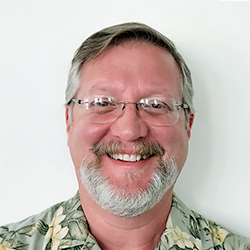One-on-one with Eduardo Acuna
A clinical associate professor at the Farley Center, Acuna brings 25 years of business experience into the classroom alongside a sincere desire to help students thrive.
Combining a 25-year career in business development with an earnest spirit, Farley Center for Entrepreneurship and Innovation clinical associate professor Eduardo Acuna (KSM ’99) hopes he empowers all the Northwestern University students he encounters to pursue their passions.
Acuna, after all, has achieved that himself and knows how valuable that pursuit can be.
 After receiving two electrical engineering degrees from the University of Illinois, Acuna was drawn to the entrepreneurial life. He launched smart card company AcuServe in 1998, and acknowledges he “made every mistake known to man” over the upstart firm’s two-year run.
After receiving two electrical engineering degrees from the University of Illinois, Acuna was drawn to the entrepreneurial life. He launched smart card company AcuServe in 1998, and acknowledges he “made every mistake known to man” over the upstart firm’s two-year run.
In 2004, he sought business leadership redemption and joined KMA Sales, an electronic manufacturers’ representative. Over the subsequent 14 years, he and his two fellow co-owners led the Wisconsin-based company on an impressive run of growth before a successful exit.
Two years ago, he joined the Farley Center’s faculty ranks as clinical associate professor and Robert Packer and Camilla Rab Fellow, eager to help Northwestern students develop and define their life’s next steps through courses such as Principles of Entrepreneurship, Entrepreneurial Sales and Marketing, and Leadership, Ethics, and You. He also serves on the faculty team for the renowned NUvention: Medical.
“Never discount the importance of having purpose and working for the greater good,” Acuna said.
Below, Acuna shares his perspectives on entrepreneurship, teaching, and creativity.
What does entrepreneurship mean to you?
The definition I give in class is creating something new to solve an existing need that isn’t being solved well currently. There’s another critical element: you’re not just thinking about your solution in the shower, but rather taking action and figuring out how to get your solution to all the people it can help.
How would you characterize your teaching philosophy?
I try to live what I teach. So, when I lead a course on entrepreneurship, I am trying to identify an unmet need, put a laser focus on the customer, and offer a solution that delivers value.
Now, I’m not sure what each individual student needs, so I get to know them. I look at the visual roster and memorize every student’s name before the first class. Early on, I also meet with each student to discover what they want to learn and what’s important to them. I then ask for a lot of feedback. The goal is to treat students the way an entrepreneur should treat customers – getting to know what’s of value to them so I can deliver that.
What key lessons from your own business career do you bring into the classroom?
The number one lesson is that it’s not about you. If you’re trying to make a buck or feed your ego, you’re likely to make the wrong choices because you’ll be evaluating decisions using skewed criteria. If, however, you put the customer first and put creating value for them as your top priority, then everything else follows. Customers will appreciate that and return to you because you are someone who can help them accomplish their objectives. Sticking with the customer-first mindset seldom steers you wrong in business.
You’ve taught Principles of Entrepreneurship multiple times now, which is often students’ first touchpoint with entrepreneurial education. What are you trying to impart to students in that foundational course?
At the most fundamental level, I want students to realize there’s an opportunity to create value in any interaction they have, both for the people they’re working with and themselves. In entrepreneurship, we create value, solve problems, and help each other out, all of which can be remarkably uplifting.
What advice do you give to aspiring entrepreneurs you encounter?
Be honest with yourself because entrepreneurship is not for everyone. It brings a lot of insecurity. It requires a lot of hustle and involves some luck. So, first, self-reflect and discern whether entrepreneurship is right for you. Then, spend a lot of time identifying a specific need in as much detail as possible by speaking to the people who are experiencing the problem. If you spend six to nine months exploring a problem and don’t develop a personal passion for it, then it’s going to be tough to keep plugging along with all the difficulties entrepreneurship brings.
One of your own original paintings hangs in your Farley Center office. What role has creativity played in your professional life?
Creativity is critical to me, and it goes beyond painting to woodworking, metalworking, and leatherwork. I believe an entrepreneur is, ultimately, a problem solver. In some cases, a problem is well defined and it’s just about executing a known solution. But many other problems in the entrepreneur’s world are new and require exploration. What does a customer think? How might a particular tool be used? In that world of exploration, divergent thinking – going beyond and trying to see the biggest picture possible – leads to the best solutions. For me, having creative outlets promotes this mindset and helps me see a path to different solutions whenever a problem arises.
